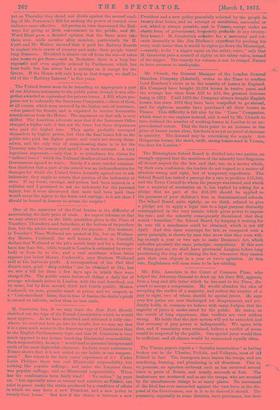The United States seem to be intending to appropriate a
part of our Alabama indemnity to the public purse, though it was alto- gether awarded as equivalent for private losses. A Bill which pro- poses not to indemnify the Insurance Companies,—those of them, at all events, which were covered by the higher rate of insurance, —has passed the Senate, and is expected to receive favourable consideration from the House. The argument on that side is very skilful. The American advocate says that if the Insurance Office charged a higher rate, it was not the loser, but those shipowners who paid the higher rate. They again probably recouped themselves by higher prices, but then the final losses fell on the public who paid the higher prices and could not recoup them- selves, and the only way of compensating them is to let the Treasury take the money and spend it on their account. A very ingenious argument,—only that it re-introduces the claims for "indirect losses" which the Tribunal disallowed and the American Government agreed to waive. Surely if a more careful examina- tion discloses that a part of the award was an indemnification for damages for which tire United States formally agreed not to ask indemnity, they ought to return that portion of the indemnity at once. If my horse, carriage, and person had been injured in a collision and I promised to ask no indemnity for the personal injury, but it were discovered that more had been paid than would cover the injury to the horse and carriage, is it not clear I should be bound in honour to return the surplus ?


































 Previous page
Previous page